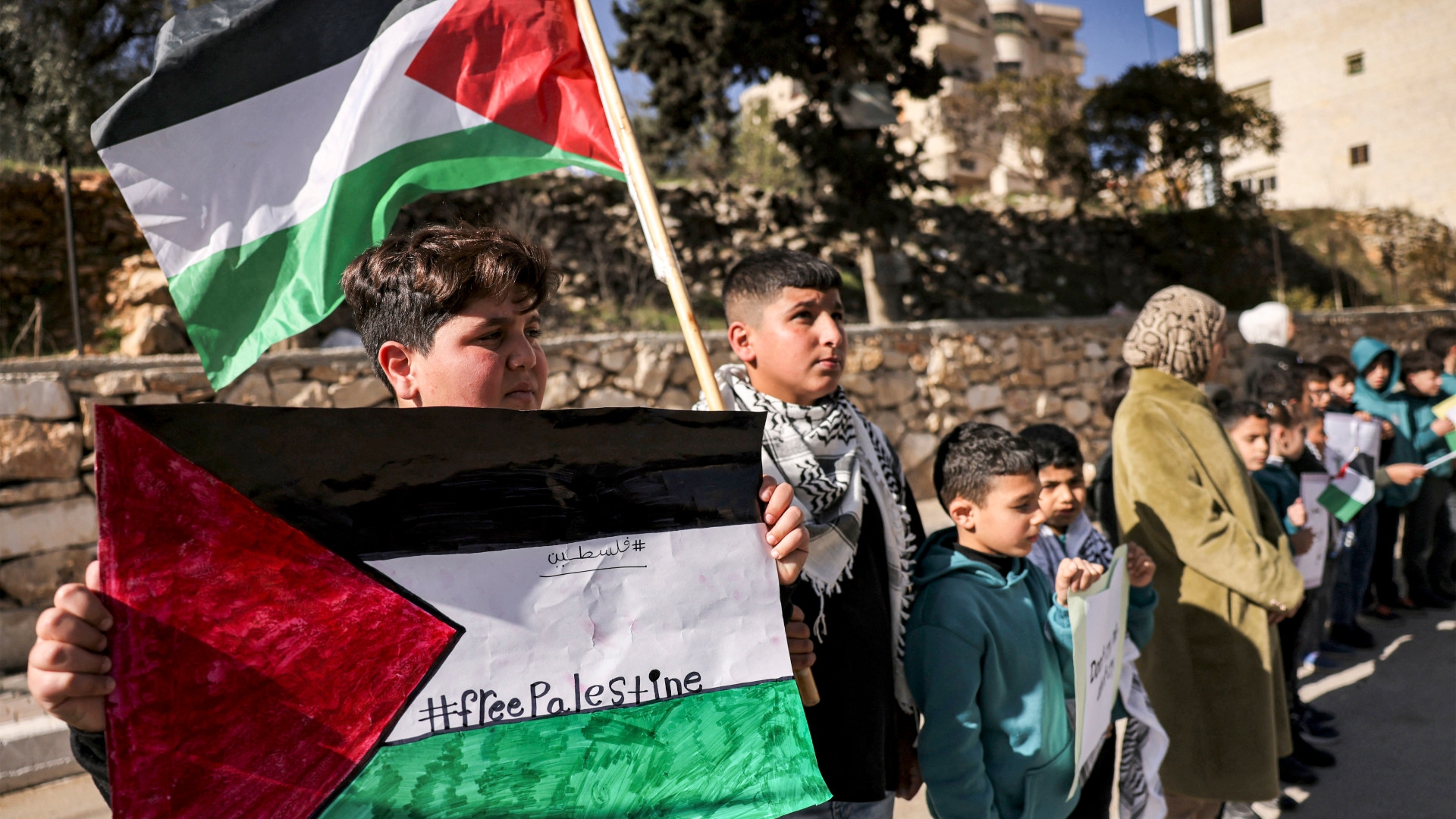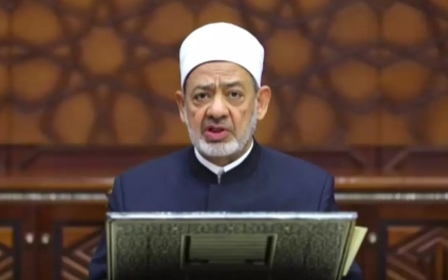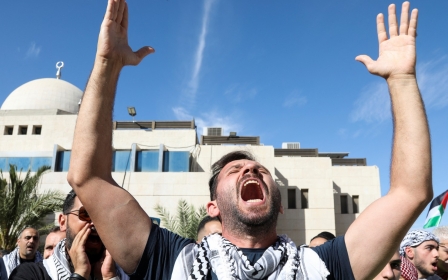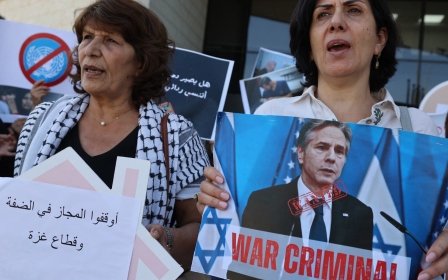Israel-Palestine war: How Israel has tried and failed to divide Palestinians

Since 7 October, western media outlets and politicians have referred to Israel's genocidal war on Palestinians in Gaza as the "Israel-Hamas war".
They adopted Israeli talking points that the war was strictly against Hamas.
Yet for more than two months, Israel's indiscriminate bombing of all aspects of Palestinian life in Gaza, including schools, universities, bakeries, hospitals, UN facilities and residential neighbourhoods, has discredited its claims it is only targeting Hamas.
Israel has also perpetrated the lie that Hamas is to blame for its war crimes against Palestinian civilians, while Israeli leaders have spoken openly about collective punishment.
The Israeli government has also tried to convince Palestinians to distance themselves from joining the resistance by employing various divide-and-conquer tactics against them.
New MEE newsletter: Jerusalem Dispatch
Sign up to get the latest insights and analysis on Israel-Palestine, alongside Turkey Unpacked and other MEE newsletters
One longstanding policy of successive Israeli governments is to classify Palestinians to divide and create competition among them.
For decades, the Israeli government has placed Palestinians into different categories, subjecting them to Israel's security system for control, and tearing apart the social fabric that could unite them as one people with a shared political objective.
Recently, Israeli leaders indicated their concerns about Palestinians achieving unity after the "elimination of Hamas". Prime Minister Benjamin Netanyahu, who has long perpetuated the division between the West Bank and Gaza, has repeatedly rejected any unified Palestinian Authority (PA) between the two regions.
However, these classifications have been dismantled during Israel's current war.
Even the recent prisoner exchange deal, in which the Israeli government exchanged Palestinian prisoners from the West Bank, Jerusalem and the 1948 region for Israeli captives, proved that there is no distinction between Palestinians of different backgrounds and factions.
Indeed, there is no distinction among Palestinians facing Israeli aggression.
Mechanisms of control
Israel has invested significant resources in dividing Palestinians into different "types": those who hold Israeli citizenship, referred to as 1948 Palestinians or "Israeli Arabs", as Israel likes to call them; the Palestinians in East Jerusalem; West Bank Palestinians; and the "Gazans".
These classifications were specifically designed to prevent any social, political or economic communication among Palestinians
More than two million Palestinians hold Israeli citizenship and are descendants of the indigenous Palestinians who remained in their lands during the Nakba in 1948.
Since 2003, the Israeli government has placed a "temporary order" banning family unification if one spouse is an Israeli citizen and the other a resident of the occupied territories (excluding Jewish settlers). This was done to prevent any social and political relationship between Palestinian citizens of Israel and those in the West Bank and Gaza.
Even before 2003, according to Human Rights Watch, "obtaining permanent Israeli residency and citizenship for Palestinians from the Occupied Palestinian Territories married to Israelis was an arduous and drawn-out process". The average processing time for an application was five years until applicants would receive a result of either approval or denial. Those who advanced would spend several more years in various legal statuses until they were approved for permanent legal status.
Jerusalemites are the Palestinians of Jerusalem who lived there before Israel occupied it in 1967. According to Israeli law, they are "residents" of Jerusalem but not citizens. They hold a blue Jerusalemite identity card that allows them to reside in Jerusalem and travel within Israel and the West Bank. They hold a Jordanian passport and an Israeli travel document called "laissez-passer", which allows them to travel abroad. They are prohibited from carrying any Palestinian documents.
Follow Middle East Eye's live coverage for the latest on the Israel-Palestine war
Since they are "residents" of the city, they lose this right if they travel abroad for longer than a specified period or if they live anywhere outside the city of Jerusalem. Jerusalemites who marry Palestinians from other areas are not allowed to settle with their spouse in Jerusalem. I know many cases of people who were deprived of their residency for such reasons.
Palestinians in the occupied West Bank hold a green identity card issued by the PA and are prohibited from residing in or entering the 1948 lands beyond the Green Line, including Jerusalem, except through special and temporary permits issued by the Israeli Civil Administration in the West Bank.
Furthermore, they are not allowed to enter the Gaza Strip, except through very limited permits and under tight and strict conditions. This directly led to vast political, economic and social divisions between Gaza and West Bank Palestinians. West Bank Palestinians cannot travel abroad through Israeli airports but must travel through the Allenby Bridge, the border crossing with Jordan, which is under direct Israeli control.
Finally, among the different Palestinian groups, the 2.3 million Palestinians in the Gaza Strip are under the tightest restrictions. Since 2007, they have faced a suffocating blockade and multiple wars claiming tens of thousands of lives.
The people of Gaza hold a Palestinian identity card and a Palestinian passport issued by the PA. They are prohibited from travelling beyond the Green Line or to the West Bank, with very few exceptions and limited permits. They are connected to the outside world through the Rafah crossing bordering Egypt, which has been regularly closed by Egyptian authorities since the beginning of the siege in 2007.
According to UN data, the worst period for closures was between 2015 and 2017, when the crossing was open for an average of only three days per month. It was mostly open in the five years before that, while it averaged a closure around every other day since 2018.
Additionally, Palestinians in Gaza face numerous restrictions on entry and exit from the small enclave. Numerous closures of the crossing or reduced working hours cause overcrowding, which causes long travel delays. Travellers must therefore register to leave days, if not weeks, in advance just to secure the opportunity.
Although there are no formal legal restrictions, the people of Gaza cannot in practice marry Palestinians from the West Bank because they simply cannot go there. At the same time, West Bank residents are not allowed to enter Gaza. There are few cases where this happened.

One such case is that of my nephew who is from the West Bank but fell in love with a girl from Gaza. They spent many years trying to get a reunification permit either in the West Bank or in Gaza but failed. With no option but to leave, they later moved to Cairo to meet and get married there.
These geographical classifications were designed to prevent any social, political or economic communication among Palestinians according to their residence and legal status. The Israeli Civil Administration classify the Palestinian residents of the West Bank and the Gaza Strip according to their political and security behaviour and economic status, through the so-called "permit regime".
Palestinians residing either in the West Bank or Gaza are not allowed to enter Israel or Jerusalem and are denied the freedom of movement between the West Bank and the Gaza Strip except when a permit is issued by Israeli authorities.
For such a permit to be issued, Palestinians must first obtain a magnetic card issued by the Civil Administration which entails submitting one's biometric information to the Israeli army. Such sensitive information will certainly be used later for security purposes that perpetuate the occupation and control of the lives of millions of Palestinians.
Once they obtain a magnetic card, which must be renewed periodically, Palestinians are eligible to apply for a permit. Permits can only be issued with the approval of the Israeli intelligence agents. Anyone suspected of carrying out any act that Israeli authorities consider "hostile or terrorist or might threaten the security" is denied. It is not sufficient for applicants themselves to have clean records; the stringent conditions are extended to their family members.
According to Gisha, an Israeli human rights organisation dedicated to protecting Palestinians' right to freedom of movement, thousands of permit applicants are placed under "security blocks". The stories of how Israeli intelligence authorities bargain with Palestinians who need a permit abound. They often will ask them to provide information or collaborate with Israel in exchange for the permit.
'Classifications within classifications'
Israel's classifications are so excessive that there are "classifications within classifications". An example is the government's targeting of specific cities in the West Bank, such as Jenin and Nablus, where pockets of resistance formed. Israeli forces conducted violent raids and military incursions into those cities and subjected all of their residents to collective punishment.
On the other hand, Israel provides some privileges to a limited number of Palestinians in the West Bank and the Gaza Strip, according to their political, security, social and economic status. "VIP" cards are issued to Palestinian officials, enabling them to enter Israel and travel through Ben Gurion Airport. They enjoy special treatment and move through a separate line from the rest of the Palestinian population at checkpoints and crossings when travelling.
Israel has invested tremendous resources to rip apart Palestine's social fabric and keep its people divided
Similarly, Israel issues "BMC" or "Business Man Cards" to Palestinian big investors and businessmen, also granting them entry into Israel and travel through the Tel Aviv airport. "BMC" cardholders enjoy the highest privileges in the classification system, including, for example, the right to enter Israel with their personal vehicles.
A few years ago, joint Israeli-Palestinian-Jordanian parties established a "border VIP service" transportation company at the Allenby crossing. It provides a rapid transportation service so Palestinian travellers can enjoy the treatment reserved for foreigners and VIPs in exchange for a high fee. It enables them to avoid crowds, travel delays and contact with the public while crossing the border, particularly during peak season.
In its extensive classification policy, Israel has invested tremendous resources to rip apart Palestine's social fabric and keep its people divided. But in its wanton killing of Palestinian children and women, and its annihilation of the foundations of society in Gaza, Israel is showing its true colours.
As it continues to wage a genocidal war, it does not distinguish between one Palestinian and another, whether in the West Bank or Gaza, or from the Fatah movement or Hamas. Netanyahu was very clear when he said he saw no difference between Hamas and the PA and indicated that Israel was preparing for the possibility of war with the PA, stating that Gaza "will be neither Hamas-stan nor Fatah-stan".
For the Palestinians, even before 7 October, the feeling that they were one people with a common destiny did not waver, and it became more entrenched during wars and crises, as it is now.
This is clear through the demonstrations, the spirit of solidarity and the intense resistance against the occupation, whether in Jerusalem, in Jenin - which has come to be called "Little Gaza" - and Nablus or in Jabalia and Khan Younis.
Palestinian blood is one and the bullets of the occupation do not differentiate.
The views expressed in this article belong to the author and do not necessarily reflect the editorial policy of Middle East Eye.
Middle East Eye delivers independent and unrivalled coverage and analysis of the Middle East, North Africa and beyond. To learn more about republishing this content and the associated fees, please fill out this form. More about MEE can be found here.





